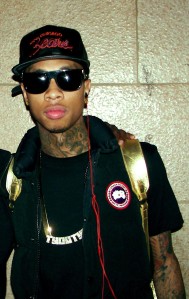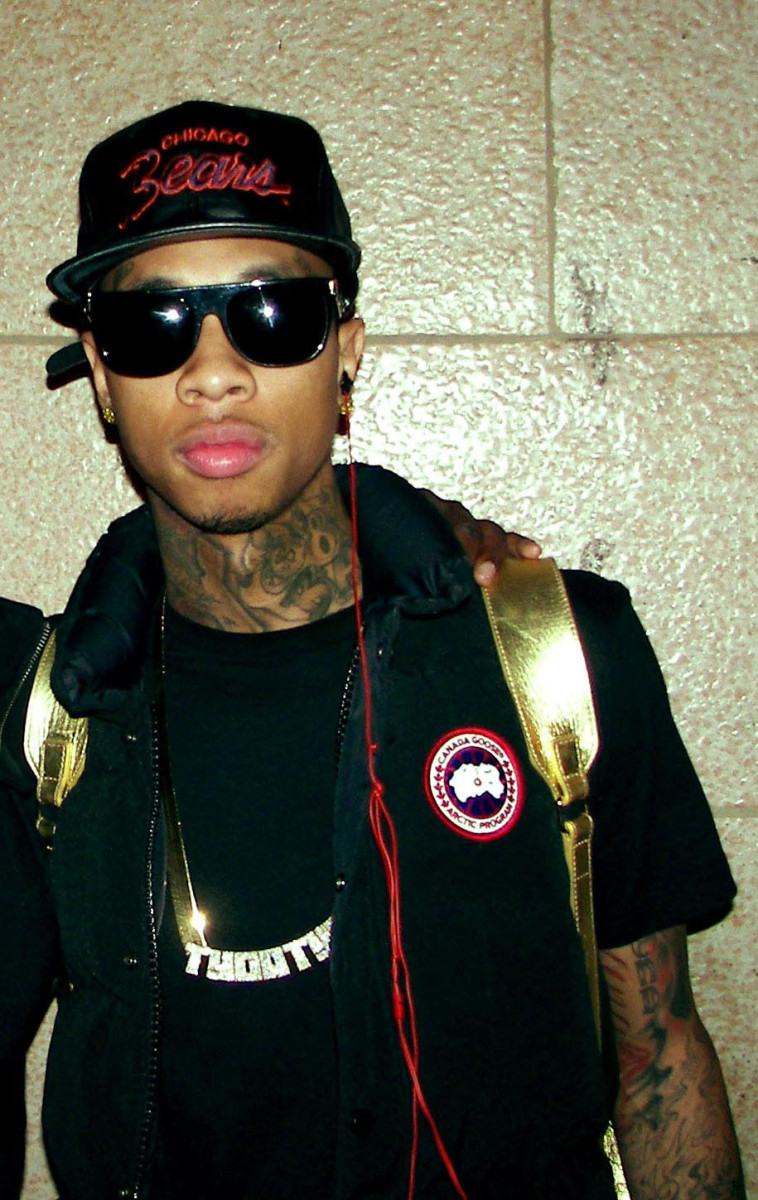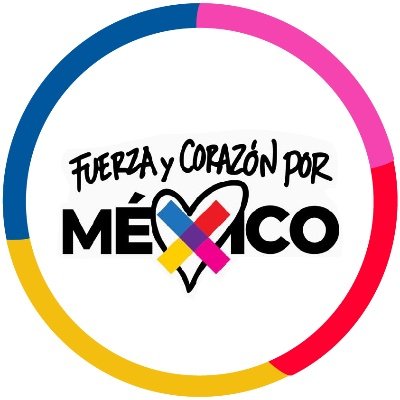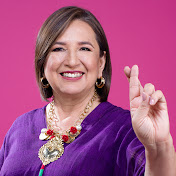Joshua Hernández and Rachel Cheong
 As two self-identified feminists of color on the Ivy League grind, it often becomes difficult to draw the line between how we feel, and how our academic training at Harvard has taught us to feel. As people of color, we recognize the that Hip-Hop continues to be a powerful form of resistance for working class communities and folks of color, and Hip-Hop artists are manifestations of this resistance. However, as feminists that have been formally trained at Harvard, we also recognize that some artists do perpetuate problematic views on gender and sexuality. This post was inspired by ongoing debates about the College Events Board’s decision to invite Tyga to headline this year’s Yardfest (and by invite, we mean pay thousands of dollars for a live performance). All T all shade, this post is about the uncomfortable experience of feeling like you have to choose between the color of your skin and your feminist associations. Because we know y’all have stuff to do, we decided to keep it short…ish.
As two self-identified feminists of color on the Ivy League grind, it often becomes difficult to draw the line between how we feel, and how our academic training at Harvard has taught us to feel. As people of color, we recognize the that Hip-Hop continues to be a powerful form of resistance for working class communities and folks of color, and Hip-Hop artists are manifestations of this resistance. However, as feminists that have been formally trained at Harvard, we also recognize that some artists do perpetuate problematic views on gender and sexuality. This post was inspired by ongoing debates about the College Events Board’s decision to invite Tyga to headline this year’s Yardfest (and by invite, we mean pay thousands of dollars for a live performance). All T all shade, this post is about the uncomfortable experience of feeling like you have to choose between the color of your skin and your feminist associations. Because we know y’all have stuff to do, we decided to keep it short…ish.
Let’s start off by acknowledging that Tyga’s lyrics perpetuate a form of sexism. His songs are real basic, so what you hear is what you get: glorifications of hypersexualized violence and predatorial sexuality. But the question we have to answer isn’t whether Tyga is sexist or not. It’s more complex than that.
If we want to talk about Tyga, we first have to talk about how his image as a black rapper is packaged and sold to an American public. The real questions are: What tensions have come up because of Tyga’s booking at Yardfest? Why do we care? And what should we do when, as feminists, we disagree about how to answer these questions?
“Make it Nasty”: Rape Culture, Hip-Hop, and the Commodification of Black Male Sexuality
It’s true that we live in a culture that perpetuates sexual violence. It’s no less true that black men have historically been brutalized because of the racist assumption that they’re sexually violent––a stereotype that’s made big bucks for the music industry. Tyga is a rapper who has been plucked, polished, and repackaged by recording labels to sell a profitable image of black male sexuality, the performer of a racially-charged role that makes him an easy target for mainstream feminist critique.
This is the issue with Tyga: he’s a black rapper stripped of his artistic autonomy and repackaged for mass consumption. When we look at Tyga’s discography, we notice a drastic change between his first album (“No Introductions”, 2008) to his breakthrough mixtape with Chris Brown (“Fan of a Fan”, 2010). Tyga starts off rapping about his love for “ink” and writing in “Diamond Life”, and ends up “throwin’ money in the club” in “Bouncin’ on my Dick”. In other words, both Tyga’s message and quality of lyrics changed upon his rise to fame.
Largely controlled by rich white men, the rap industry packages a hyperviolent, hypersexualized image of inner-city men of color and sells it to us for profit. We then use this commodified image to demonize people of color, labeling black and brown men hyperviolent and hypersexual, agents of sexism, misogyny, and homophobia (problems obviously exclusive to inner-city communities and people of color).
On the word “Bitch”: Hip-Hop, Feminism, and the Politics of Reclamation
A recently circulated email protesting Tyga’s performance had the subject line, “Do you like being called a bitch?” A common criticism of hip-hop is that its near-universal use of graphic slurs renders the genre inherently misogynistic and homophobic. We don’t think it’s necessarily problematic to listen to music that uses problematic language. Tyga’s words mean different things to people with different histories of privilege and oppression.
It’s critical to note that gendered words like “bitch,” and even “dick,” don’t have single definitions. Language takes on varying meanings across cultural contexts. When we attack hip-hop as a genre for its use of ‘sexist language’ (instead of commenting on Tyga’s use of language as an individual) we erase the histories of queer people of color and allies who have found empowerment through ‘problematic’ lyrics.
Words like bitch, cunt, pussy, and dick are continually used in complex and nuanced ways within the hip-hop community. Female and queer artists of color such as Mykki Blanco, Azealia Banks, Le1f, and Angel Haze have reclaimed gendered slurs, transforming them into tools to critique heteropatriarchal structures. Many QPOC in the hip-hop community find empowerment in exploring various forms of femininity and masculinity through graphic language, continually blurring the line between what is and isn’t “problematic.”
There’s another layer of power present in the campus critique of hip-hop. It’s important to note that not everyone has the luxury of comin’ for Tyga and the nuances of “problematic” language the way we (as feminist writers and as a Harvard community) are now.
As Harvard students, we’re supported by a vast apparatus of class and educational privilege that has taught us what is problematic, and how to deconstruct these issues. But what does it mean when we use those privileges to police the expression of marginalized peoples? When it comes to Tyga, can we critique him without demonizing Hip-Hop as a genre, and can we legitimately have a productive discussion without overstepping class and racial boundaries?
What Should We Do?: On Signing and Not Signing, On Going and Not Going
The current debate around Tyga’s appearance at Yardfest implies that there’s one right way to feel about the situation as feminists, and a single list of appropriate actions to take: sign the Change.org petition, email the CEB demanding a change of performers, don’t go to Yardfest.
While there’s nothing inherently wrong with any of these actions, things get problematic when these actions become The Feminist Response. First of all, the feminist movement has a long and pretty disgusting history of white, wealthy, straight, cis-gender women deciding for everyone else what the feminist movement looks like, wants accomplished, and pays attention to. Which––surprise!––turns out to be the needs and desires of white, wealthy, straight, cis women.
Privileged feminists have historically constructed a feminist movement that ignores and excludes the interests of people of color, the working class, queer folk, etc. Our shared work for liberation is always being turned into another tool for exclusion. Keeping this in mind, we should think twice about calling people bad feminists when they don’t sign the petition or decide to go to Yardfest.
The choice to go or not go to Yardfest is not the same as the choice to perpetuate or dismantle the patriarchy. Equating the two is not only exclusionary, it ignores the complexity of our decisions and the diversity of possible forms of protest.
Yardfest was supposed to be ours. Without our consent, it’s been transformed from a welcoming community space into a venue that, for many of us, feels hostile and exclusionary. Some feminists still want to attend, out of a desire to reclaim a much-anticipated community event. They now run the risk that their attendance will be construed as a complicit support of misogyny.
We can hear misogynistic messages without supporting misogyny; we can live in sexist spaces without sacrificing our commitment to fighting sexism. The suggestion that we can’t is intellectually patronizing; it implies that we’re either too naïve or too stupid to do anything but internalize propaganda blindly.
It also ignores the omnipresence of sexism: as people who live in a misogynistic culture, almost every space we enter is problematic. We’ll have to negotiate the divide between our ideologies and our realities explicitly and overtly at Yardfest, but as feminists, that’s a gap we’re all well-versed in navigating.
Road Trip to Rack City: A Final Note On Intersectionality
What we need right now is solidarity. Racist/Sexist/Racist/Sexist. Let’s talk about racialized sexism, about sexualized racism. Pitting our oppressions against each other only prevents us from seeing the intersectionality of our struggle, creating divisions when we most need support. This is not about Harvard feminists winning against Harvard people of color. This is about coming together as a community to fight a racist patriarchy, and we can start by recognizing that there are many legitimate ways to respond to Tyga’s performance at Yardfest.
Let’s just put it out there: we know some of y’all are gettin’ it to Rack City in private. Ain’t no shame. The concerns raised about Tyga’s performance are real and valid, but the race and class dynamics of campus discussions have put us in a tight spot as feminists of color. What we’re saying is, this isn’t the time to police each other’s social justice credentials. Nobody should be revoking anyone else’s Good Feminist Card.
Share this:
This content was originally published here.
EL 2 DE JUNIO DEL 2024 VOTA PARA MANTENER
TU LIBERTAD, LA DEMOCRACIA Y EL RESPETO A LA CONSTITUCIÓN.
VOTA POR XÓCHITL













Comentarios